While the midfield rebuild has dominated discussions around Liverpool’s summer transfer business so far, the lack of defensive reinforcements is a major cause for concern.
With next week’s transfer deadline looming large, it’s fair to say that Liverpool still have some significant work to do if this window is to be considered an overall success.
Despite the surprise signing of Wataru Endo from Stuttgart last week, there remains an obvious need for one more high calibre midfielder, ideally of a younger age – whether it be a specialist number six or a more versatile, multi-functional type.
It remains to be seen whether Liverpool make a move for one of the perpetually linked targets such as Cheick Doucoure, Ryan Gravenberch, Khephren Thuram or Manu Kone, or perhaps another name that emerges totally out of the blue.
But it does seem as though Liverpool are at least still considering their options in this regard.
By complete contrast, there is no indication, at present, that Liverpool are actively pursuing a centre-back signing.
Given the notable absence of credible links to defenders throughout the window, other than the brief suggestions of interest in Levi Colwill – a deal that never seemed remotely on the cards – it seems increasingly likely that Liverpool will be pressing ahead with their existing defensive options.
If that remains the case, it’s an enormous risk to take, leaving Liverpool dangerously reliant on the availability of Virgil van Dijk and Ibrahima Konate, which is by no means guaranteed.
Walking an unnecessary tightrope
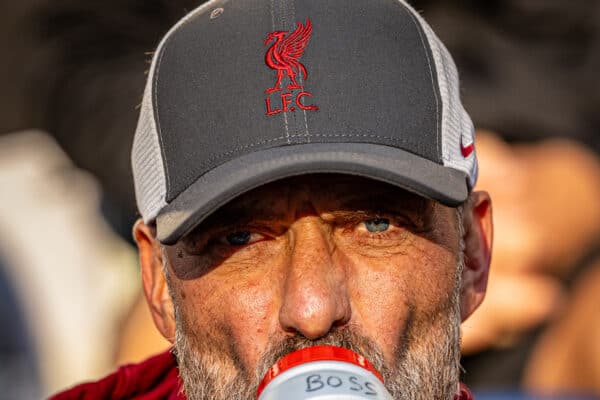
Presuming that Jurgen Klopp is committed to the ‘box midfield’ system, which all the signs throughout pre-season and in the opening two games certainly point towards, then the presence of Konate is absolutely integral to making it work.
He’s the only player in the squad with the blend of speed, physicality and positional sense to effectively cover such an enormous amount of ground in that right-hand channel – and as brilliant as he is, it’s an extremely tough task even for him at times.
Although Joe Gomez might’ve been perfectly suited to that role in the past, it’s difficult to ascertain what his true level is these days, and the unconvincing nature of his performances at times last season suggests that injuries have taken a considerable toll.
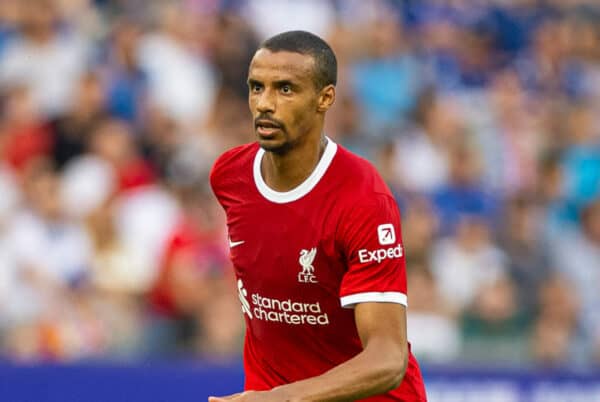
He might be good enough to fill in occasionally against certain levels of opposition, but it’d be a concern if Liverpool suddenly had to depend on him for a prolonged period of time.
Likewise, Joel Matip’s levels have declined quite dramatically, and the gulf in class between him and Van Dijk is much larger than it once was.
A system inhibiting Robertson
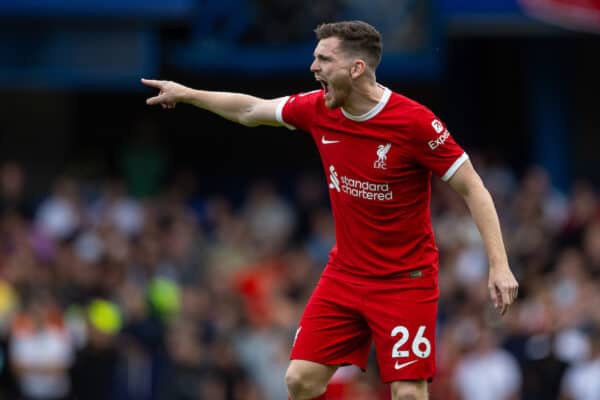
Even putting aside questions around Gomez and Matip’s ability to perform at the required level, there’s also the issue around whether you can actually depend on them to be available when you need them to be, given their susceptibility to injury (both players have missed more than 40 games through injury since 2019/20).
You could make a similar argument about the drop off from Andy Robertson to Kostas Tsimikas as well, but neither player looks a particularly comfortable fit in that left-sided centre-back role, which requires much more positional discipline as opposed to constantly bombing up and down the wing like a typical full-back.
Robertson is certainly good enough to do a reasonable job there in certain matches (as he did in the 3-1 win against Bournemouth), but it’s a position which inhibits many of his finest qualities and tends to expose the weaker elements of his game.
In an ideal world, Liverpool would’ve signed a left-footed centre-back this summer – not necessarily to permanently displace Robertson, but to provide a more natural, defensively minded alternative, similar to what Pep Guardiola has done at Man City with Nathan Ake, Manuel Akanji and, most recently, Josko Gvardiol.
By choosing not to bolster their options, it feels as though Liverpool are leaving themselves in an unnecessarily fragile situation at the back, which they’ve done before in the recent past and suffered heavily from as a result.
An issue several years in the making
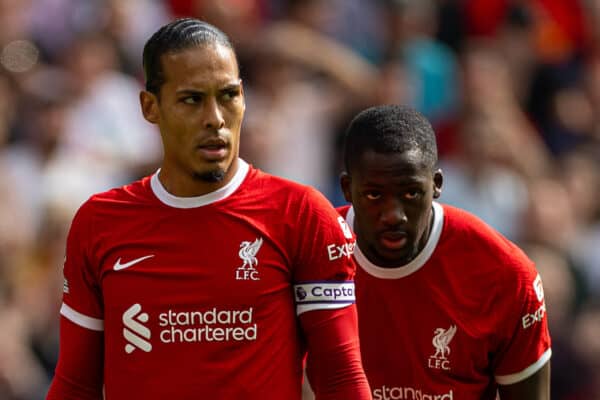
One of the peculiar aspects of Liverpool’s transfer activity in recent years is that they’ve done an immaculate job of replenishing the attacking department and planning for the future by bringing in Diogo Jota, Luis Diaz, Darwin Nunez and Cody Gakpo over five transfer windows.
By doing things gradually and letting the likes of Divock Origi, Sadio Mane and Roberto Firmino move on at the right time, the evolution of Klopp’s forward options has been pretty seamless.
It’s been a totally different story with the midfield, which had been left to stagnate for far too long, directly contributing to last season’s failure to secure Champions League qualification and leading to this summer’s overhaul, with five major departures and three arrivals so far.
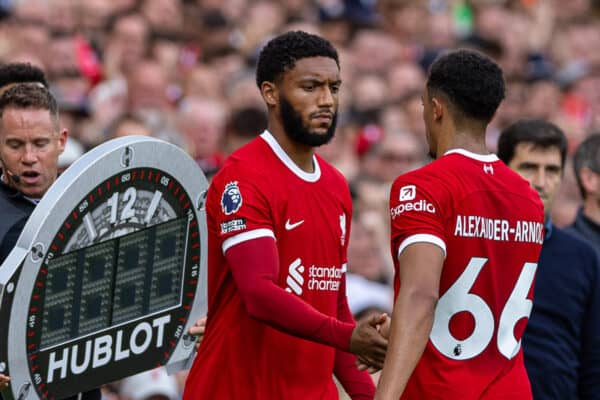
The situation with the defence hasn’t been mismanaged to quite the same degree, but when you boil it down, the only significant centre-back signing in the last five years has been Konate (the only others being Sepp van den Berg, Ben Davies, and Ozan Kabak on loan).
As superb as Konate has been, his positive impact alone doesn’t mask the fact that Liverpool haven’t invested sufficiently in this part of the squad for quite some time now.
It really ought to have been a priority on day one of this summer transfer window, with a comprehensive list of targets drawn up so that if the first choice didn’t work out, contingency plans were put in place.
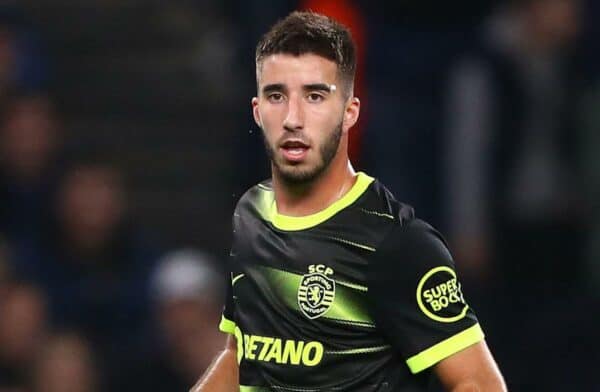
Sporting Lisbon’s Goncalo Inacio, for instance, seemed an ideal choice with a very favourable release clause (£42.9m) before recently signing a new contract, while Marc Guehi and Armel Bella-Kotchap would tick a lot of boxes if Liverpool were to go down the route of pursuing a young, high potential centre-back with Premier League experience.
For whatever reason, though, Liverpool appear to have been content to kick this particular can down the road once more rather than move proactively to strengthen their defensive options both for the new season and for years to come.
It’s too early to say what effect that decision will ultimately have on Liverpool’s fortunes in 2023/24, but if nothing changes in the next few days, it would hardly be a major surprise if it proves to be a costly error in the months ahead.
For a squad blessed with such an array of riches, it would be an enormous shame to restrict the chances of success by leaving a couple of key positions understocked yet again.


